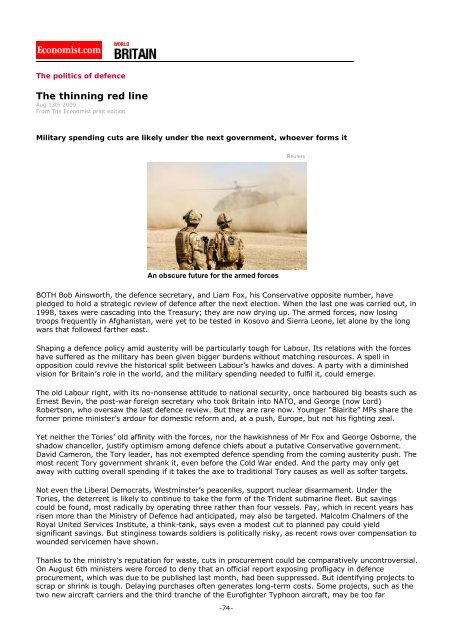Untitled - the ultimate blog
Untitled - the ultimate blog
Untitled - the ultimate blog
Create successful ePaper yourself
Turn your PDF publications into a flip-book with our unique Google optimized e-Paper software.
The politics of defence<br />
The thinning red line<br />
Aug 13th 2009<br />
From The Economist print edition<br />
Military spending cuts are likely under <strong>the</strong> next government, whoever forms it<br />
Reuters<br />
An obscure future for <strong>the</strong> armed forces<br />
BOTH Bob Ainsworth, <strong>the</strong> defence secretary, and Liam Fox, his Conservative opposite number, have<br />
pledged to hold a strategic review of defence after <strong>the</strong> next election. When <strong>the</strong> last one was carried out, in<br />
1998, taxes were cascading into <strong>the</strong> Treasury; <strong>the</strong>y are now drying up. The armed forces, now losing<br />
troops frequently in Afghanistan, were yet to be tested in Kosovo and Sierra Leone, let alone by <strong>the</strong> long<br />
wars that followed far<strong>the</strong>r east.<br />
Shaping a defence policy amid austerity will be particularly tough for Labour. Its relations with <strong>the</strong> forces<br />
have suffered as <strong>the</strong> military has been given bigger burdens without matching resources. A spell in<br />
opposition could revive <strong>the</strong> historical split between Labour’s hawks and doves. A party with a diminished<br />
vision for Britain’s role in <strong>the</strong> world, and <strong>the</strong> military spending needed to fulfil it, could emerge.<br />
The old Labour right, with its no-nonsense attitude to national security, once harboured big beasts such as<br />
Ernest Bevin, <strong>the</strong> post-war foreign secretary who took Britain into NATO, and George (now Lord)<br />
Robertson, who oversaw <strong>the</strong> last defence review. But <strong>the</strong>y are rare now. Younger “Blairite” MPs share <strong>the</strong><br />
former prime minister’s ardour for domestic reform and, at a push, Europe, but not his fighting zeal.<br />
Yet nei<strong>the</strong>r <strong>the</strong> Tories’ old affinity with <strong>the</strong> forces, nor <strong>the</strong> hawkishness of Mr Fox and George Osborne, <strong>the</strong><br />
shadow chancellor, justify optimism among defence chiefs about a putative Conservative government.<br />
David Cameron, <strong>the</strong> Tory leader, has not exempted defence spending from <strong>the</strong> coming austerity push. The<br />
most recent Tory government shrank it, even before <strong>the</strong> Cold War ended. And <strong>the</strong> party may only get<br />
away with cutting overall spending if it takes <strong>the</strong> axe to traditional Tory causes as well as softer targets.<br />
Not even <strong>the</strong> Liberal Democrats, Westminster’s peaceniks, support nuclear disarmament. Under <strong>the</strong><br />
Tories, <strong>the</strong> deterrent is likely to continue to take <strong>the</strong> form of <strong>the</strong> Trident submarine fleet. But savings<br />
could be found, most radically by operating three ra<strong>the</strong>r than four vessels. Pay, which in recent years has<br />
risen more than <strong>the</strong> Ministry of Defence had anticipated, may also be targeted. Malcolm Chalmers of <strong>the</strong><br />
Royal United Services Institute, a think-tank, says even a modest cut to planned pay could yield<br />
significant savings. But stinginess towards soldiers is politically risky, as recent rows over compensation to<br />
wounded servicemen have shown.<br />
Thanks to <strong>the</strong> ministry’s reputation for waste, cuts in procurement could be comparatively uncontroversial.<br />
On August 6th ministers were forced to deny that an official report exposing profligacy in defence<br />
procurement, which was due to be published last month, had been suppressed. But identifying projects to<br />
scrap or shrink is tough. Delaying purchases often generates long-term costs. Some projects, such as <strong>the</strong><br />
two new aircraft carriers and <strong>the</strong> third tranche of <strong>the</strong> Eurofighter Typhoon aircraft, may be too far<br />
-74-








![[ccebbook.cn]The Economist August 1st 2009 - the ultimate blog](https://img.yumpu.com/28183607/1/190x252/ccebbookcnthe-economist-august-1st-2009-the-ultimate-blog.jpg?quality=85)



![[ccebook.cn]The World in 2010](https://img.yumpu.com/12057568/1/190x249/ccebookcnthe-world-in-2010.jpg?quality=85)
![[ccemagz.com]The Economist October 24th 2009 - the ultimate blog](https://img.yumpu.com/5191885/1/190x252/ccemagzcomthe-economist-october-24th-2009-the-ultimate-blog.jpg?quality=85)